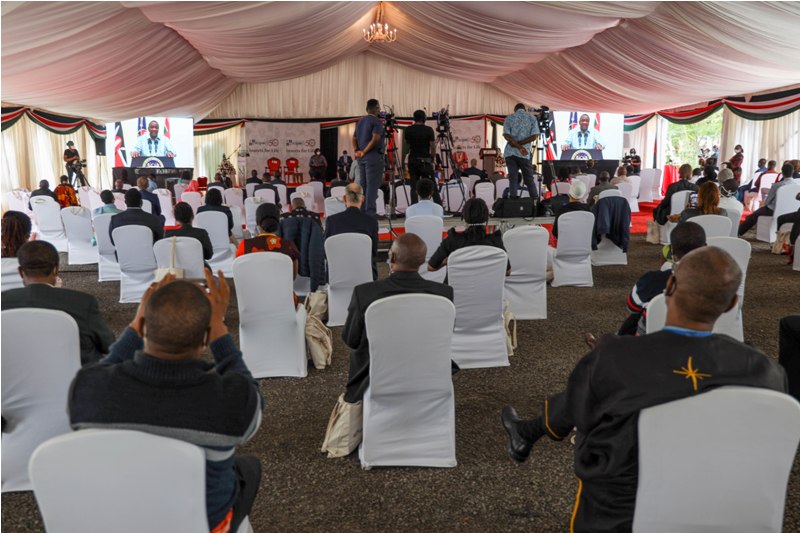Science and Research Key to Unlocking Development Potential, Uhuru says

BY MWAKERA MWAJEFA
Email, thecoastnewspaper@gmail.com
Science and research are key to unlocking Kenya’s development potential especially in finding solutions to many a challenge slowing down the country’s progress and prosperity.
President Uhuru Kenyatta, speaking during the 50th anniversary celebrations of the International Centre of Insect Physiology and Ecology (ICIPE) in Nairobi on November 20, 2020, acknowledges the importance of science and research in development programs.
Due to this, the government will continue implementing programmes aimed at nurturing its growing scientific talent pool so as to create wealth and expand employment opportunities for Kenyans.
Acknowledging the contribution of ICIPE to the growth of science and research in Africa over the last five decades, President Kenyatta in his pre-recorded video address said: “As this pioneering institution commemorates its 50 years of service, in partnership with governments across the continent, we note with appreciation the central role you have and continue to play, in insect research, plant health, animal health, environmental health, all aimed at bettering human health and welfare.”
According to him Africa must continue to expand its investment in science and research for it to achieve the aspiration of becoming a prosperous and peaceful continent.
“Indeed, Africa will continue to rely on scientific organizations not only to address present and future development challenges, but also to provide the platform upon which we may be able to take advantage of the emerging opportunities in the digital and the biological economic sectors,” he said.
In his view, ICIPE was selected by African governments to run the Regional Scholarship and Innovation Fund (RSIF) of the Partnership for Skills in Applied Sciences, Engineering and Technology (PASET).
CENTRAL OBJECTIVE
The central objective of this Fund is to train up to 1,000 doctoral level scientists annually from sub-Sahara countries in the various core fields of science.

The Kenya’s Vision 2030 and the African Union Agenda 2063 both recognize the vital role played by science and scientific organizations like ICIPE in achieving developmental objectives.
With this knowledge, Mr Kenyatta said his administration will continue working closely with scientific and research organizations as key development partners adding that the Kenyan Government had contributed more than Sh200 million to the Regional Scholarship and Innovation Fund (RIF) of the Partnership for Skills in Applied Sciences, Engineering and Technology (PASET) where he is the current chairperson.
He assured that the Kenyan Government will continue rolling out progressive policies to promote science and innovation, not only as the engine for economic growth but also as a means of addressing enduring social inequalities.
“We have made a commitment to invest up to 2% of our annual national budget in research and innovation which is in line with our national development programes,” he said.
As part of the celebrations, the President launched ICIPE’s Vision and Strategy for the period 2021 to 2025, which he described as bold and comprehensive noting that it will position the organization as a Centre for discovery and provision of solutions.
Cabinet Secretaries Raychelle Omamo (Foreign Affairs) and Peter Munya (Agriculture) commended ICIPE for its scientific and research work which they said has been key in transforming the lives of many Africans.
Mr Munya said the organisation has been recognized globally for its research work, which has greatly helped farmers to improve productivity of their enterprises.
“This work has made ICIPE to be a household name in Africa, for it has contributed to providing solutions which are not harmful to animals, plants and human life,” he said.
Other speakers included the chairperson of ICIPE Governing Council Prof Bill Hansson and the organization’s director general Dr Segenet Kelemu.
SORRY STORY
Statistics for Africa tell a sorry story, according to Global Report Food Crises; with approximately 13.5 million children less than 5 years of age (almost 1 in 3 children) are stunted across Africa, with high numbers in Ethiopia, Sudan and Uganda.
In its 2020 report, GRFC says the number of people battling acute hunger and malnutrition in the world is on the rise.
In 2019, around 182.6 million people were classified to be in food stressed conditions across 47 countries, with 71% of them concentrated in 32 countries in Africa.
Around 40% of them were in just four countries – the Democratic Republic of the Congo, Nigeria, Venezuela and Sudan — and another 19% were in Ethiopia, Afghanistan, Yemen and Kenya.
The six East African countries accounted for 27.5 million people in food crisis in the year 2019. The situation is attributed to weather-related shocks in Kenya, conflict and persistent economic challenges in South Sudan and the refugee influx and weather extremes in Uganda.
According to the World Health Organization (WHO) 1.9 billion adults are overweight or obese, while 38.3 millions of children under 5 years are overweight or obese.

